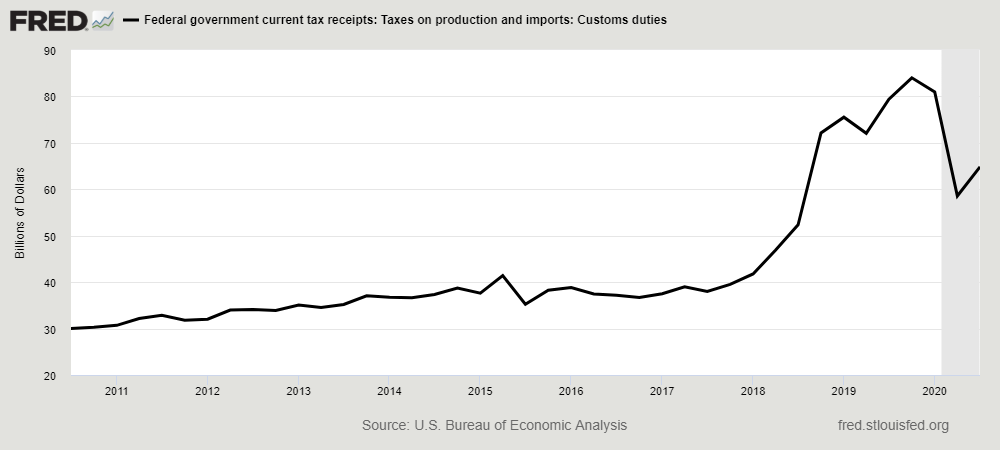Back in September, I wrote how President Trump’s failure on trade was one of the most glaring flaws of his management of the economy. That drew a response from a reader that Trump had “scored big” on trade, an odd thing to say when the trade deficit is at a 12 year high, but this is what Trumpism does.
Trump raised tariffs in an effort to stanch the flow of imports, and trade experts knew this was flawed policy, but most people know very little about a complex issue like this, and Trump’s “tough” stand played well with his voter demographic, the “forgotten” White Working Class. Unfortunately, they bore the brunt of this reckless policy.
Tariffs are a tax the federal government collects. To this day, in front of his adoring crowds, Trump insists that China pays them, which hopefully, Trump isn’t stupid enough to believe himself, but he knows his army of rubes will buy this demonstration of ruthless resolve.
Most revenues collected were effectively funneled to bail out the farmers he bankrupted when China retaliated, and by some estimates, 40 percent of farmers’ income this past year was in the form of federal grants, not for anything they sold. The farmers will still vote on tribal passions, not policy, as you would expect.
But another set of tariffs brought misery on the most romanticized sector of the economy, manufacturing. Trump executed a blanket 25 percent tariff on steel, and the result was the higher input costs that our own manufacturers had to pay wound up costing us 75,000 manufacturing jobs, according to a report by the Federal Reserve Board of Governors.
And this example shows why issues like trade are so hard for the average voter to fully grasp, and how people are so susceptible to infantilizing the issue.
There are 180 nations in the WTO, and all of them are trying to sell stuff to each other. So there has to be a framework, and once that framework is set, there will be winners and losers on both sides of the table. (This is why it is called “trade.”)
But we trade because we need these imports to make the things we want to buy ourselves, or export finished products back into the world. This is what people didn’t get about NAFTA: a North American trade system with lowered barriers to entry lowered the cost of products for everyone, including the ones who were exporting outside of the NAFTA nations, which made them more competitive globally. It is said that NAFTA may have saved the U.S. auto industry to a large extent.
The Trans Pacific Partnership would have accomplished a similar goal, and left China out in the cold. But Trump scuttled it because Any trade agreement was poison to him and his supporters, even if it was beneficial to our interests.
This points up a larger problem that is moving the country to an ungovernable state. When issues like trade or health insurance, for example, are brought before voters, they have neither the time nor the patience to understand the complexities behind them.
It’s like trying to teach algebra to a kitten. There have been so many damaging second-order effects to Trumps’ policies, but unless you’re willing to go deep into the weeds on these subjects, you’ll never even hear about them.
So trade policy, instead of being based on existing protocols, was turned into an episode of Wrestlemania. These trade frameworks were set up in the knowledge that the undeveloped world wouldn’t stay undeveloped forever, and there had to be some sort of rules-based mechanism for the world’s economy to function smoothly. But people are acting as if we could have frozen the Post War world order forever.
Not only that, a lot of the animus over job losses ignores the role that automation has played, which may have supplanted more jobs than globalization has. But you can’t scapegoat a welding robot.
Mr. Trump has soiled many of the institutions that made America respected and functional. But his biggest crime, along with his enablers in the media that side with him, is the obliteration of our public discourse.
We will all pay a price for this.



